Role of Ronald Reagan in Ending the Cold War
VerifiedAdded on 2023/01/10
|7
|1382
|44
AI Summary
This essay discusses the role of Ronald Reagan in ending the Cold War and breaking down the USSR. It analyzes his foreign policies, anti-communist approach, and expansion of the US military system.
Contribute Materials
Your contribution can guide someone’s learning journey. Share your
documents today.
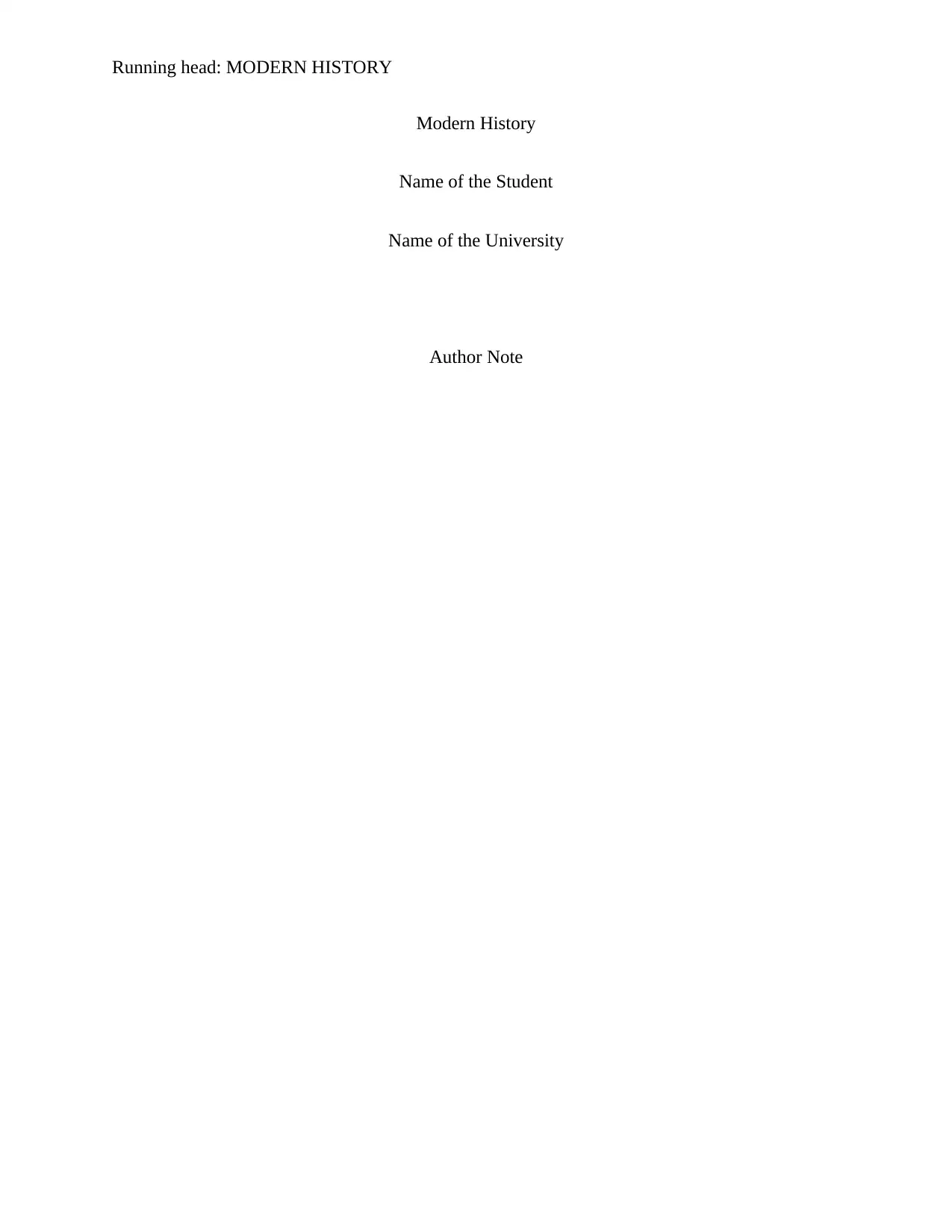
Running head: MODERN HISTORY
Modern History
Name of the Student
Name of the University
Author Note
Modern History
Name of the Student
Name of the University
Author Note
Secure Best Marks with AI Grader
Need help grading? Try our AI Grader for instant feedback on your assignments.
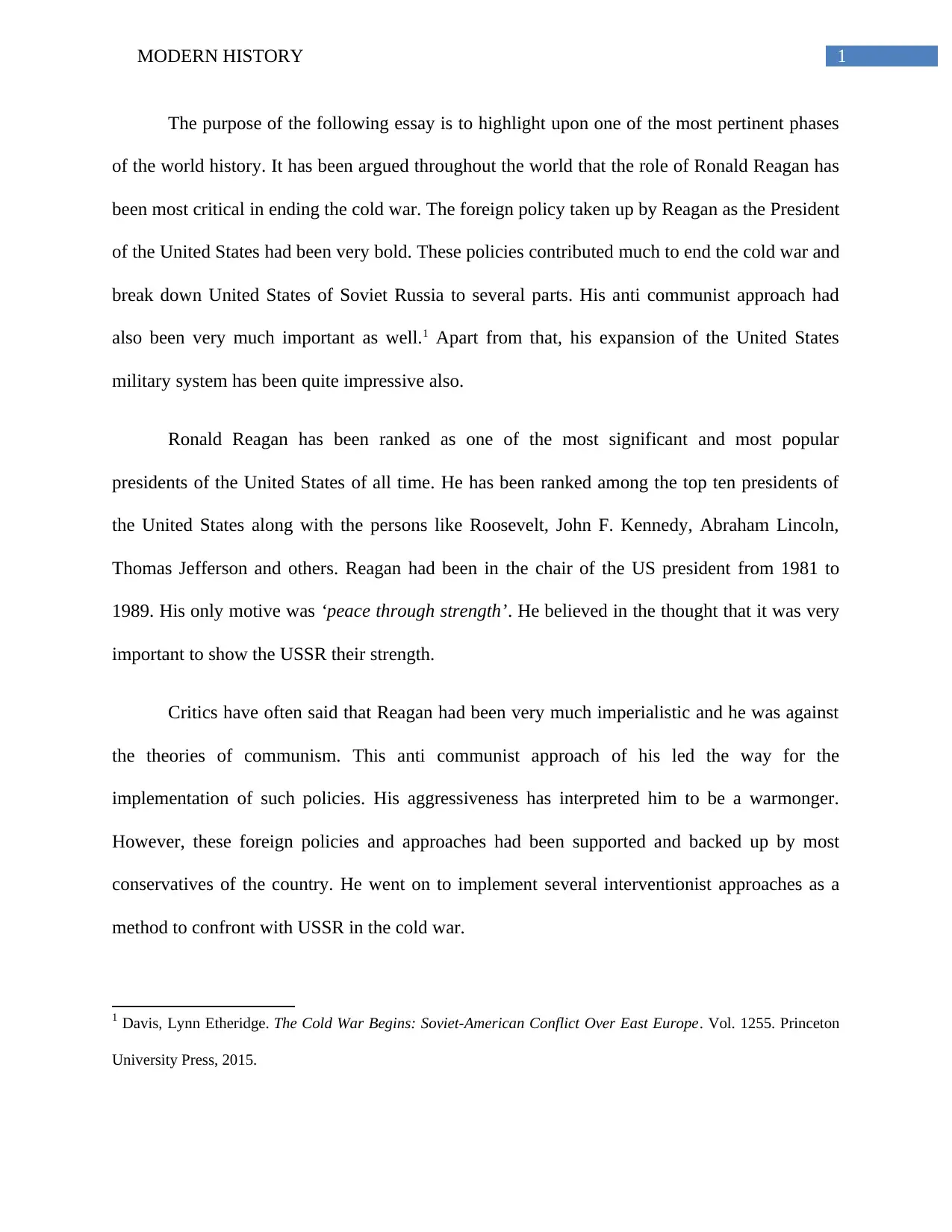
1MODERN HISTORY
The purpose of the following essay is to highlight upon one of the most pertinent phases
of the world history. It has been argued throughout the world that the role of Ronald Reagan has
been most critical in ending the cold war. The foreign policy taken up by Reagan as the President
of the United States had been very bold. These policies contributed much to end the cold war and
break down United States of Soviet Russia to several parts. His anti communist approach had
also been very much important as well.1 Apart from that, his expansion of the United States
military system has been quite impressive also.
Ronald Reagan has been ranked as one of the most significant and most popular
presidents of the United States of all time. He has been ranked among the top ten presidents of
the United States along with the persons like Roosevelt, John F. Kennedy, Abraham Lincoln,
Thomas Jefferson and others. Reagan had been in the chair of the US president from 1981 to
1989. His only motive was ‘peace through strength’. He believed in the thought that it was very
important to show the USSR their strength.
Critics have often said that Reagan had been very much imperialistic and he was against
the theories of communism. This anti communist approach of his led the way for the
implementation of such policies. His aggressiveness has interpreted him to be a warmonger.
However, these foreign policies and approaches had been supported and backed up by most
conservatives of the country. He went on to implement several interventionist approaches as a
method to confront with USSR in the cold war.
1 Davis, Lynn Etheridge. The Cold War Begins: Soviet-American Conflict Over East Europe. Vol. 1255. Princeton
University Press, 2015.
The purpose of the following essay is to highlight upon one of the most pertinent phases
of the world history. It has been argued throughout the world that the role of Ronald Reagan has
been most critical in ending the cold war. The foreign policy taken up by Reagan as the President
of the United States had been very bold. These policies contributed much to end the cold war and
break down United States of Soviet Russia to several parts. His anti communist approach had
also been very much important as well.1 Apart from that, his expansion of the United States
military system has been quite impressive also.
Ronald Reagan has been ranked as one of the most significant and most popular
presidents of the United States of all time. He has been ranked among the top ten presidents of
the United States along with the persons like Roosevelt, John F. Kennedy, Abraham Lincoln,
Thomas Jefferson and others. Reagan had been in the chair of the US president from 1981 to
1989. His only motive was ‘peace through strength’. He believed in the thought that it was very
important to show the USSR their strength.
Critics have often said that Reagan had been very much imperialistic and he was against
the theories of communism. This anti communist approach of his led the way for the
implementation of such policies. His aggressiveness has interpreted him to be a warmonger.
However, these foreign policies and approaches had been supported and backed up by most
conservatives of the country. He went on to implement several interventionist approaches as a
method to confront with USSR in the cold war.
1 Davis, Lynn Etheridge. The Cold War Begins: Soviet-American Conflict Over East Europe. Vol. 1255. Princeton
University Press, 2015.
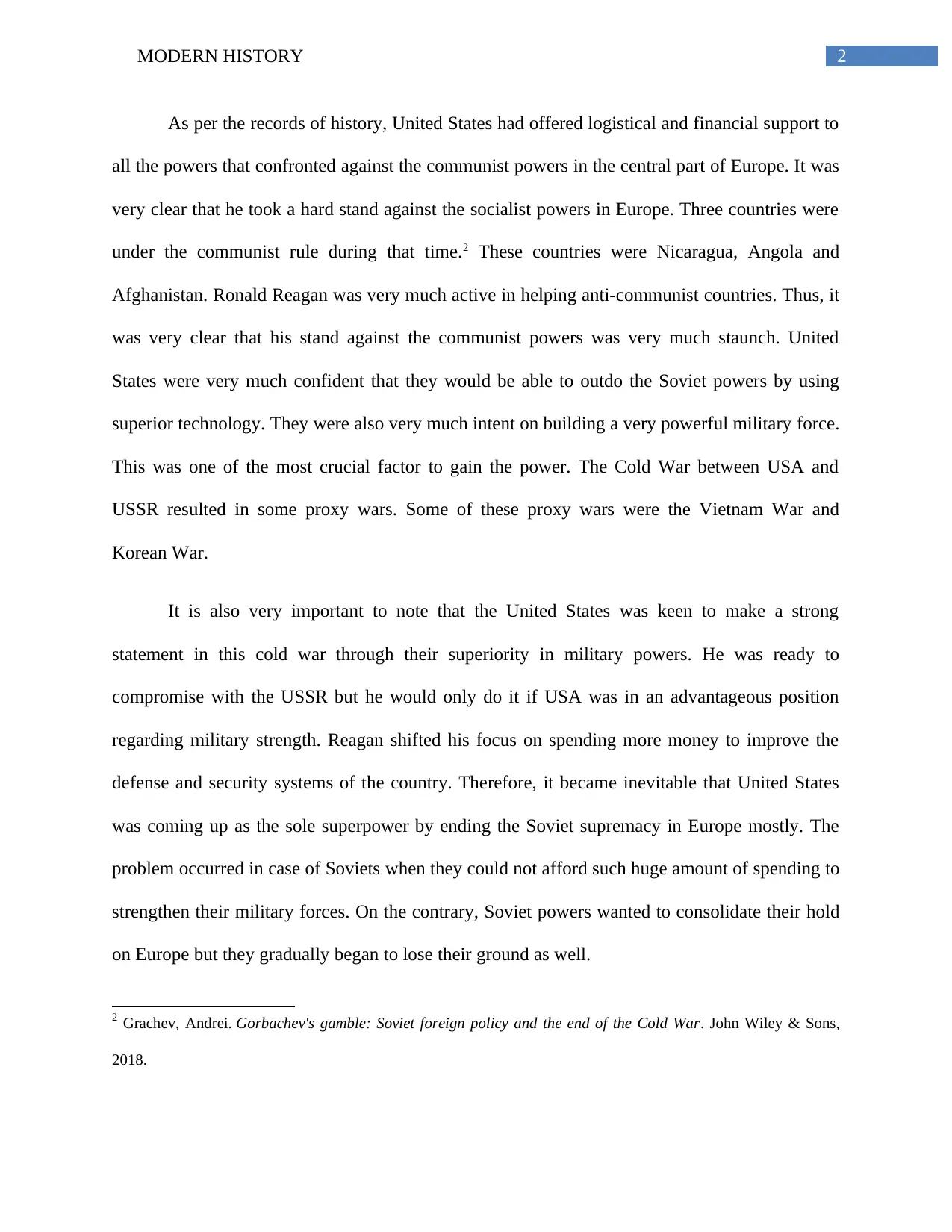
2MODERN HISTORY
As per the records of history, United States had offered logistical and financial support to
all the powers that confronted against the communist powers in the central part of Europe. It was
very clear that he took a hard stand against the socialist powers in Europe. Three countries were
under the communist rule during that time.2 These countries were Nicaragua, Angola and
Afghanistan. Ronald Reagan was very much active in helping anti-communist countries. Thus, it
was very clear that his stand against the communist powers was very much staunch. United
States were very much confident that they would be able to outdo the Soviet powers by using
superior technology. They were also very much intent on building a very powerful military force.
This was one of the most crucial factor to gain the power. The Cold War between USA and
USSR resulted in some proxy wars. Some of these proxy wars were the Vietnam War and
Korean War.
It is also very important to note that the United States was keen to make a strong
statement in this cold war through their superiority in military powers. He was ready to
compromise with the USSR but he would only do it if USA was in an advantageous position
regarding military strength. Reagan shifted his focus on spending more money to improve the
defense and security systems of the country. Therefore, it became inevitable that United States
was coming up as the sole superpower by ending the Soviet supremacy in Europe mostly. The
problem occurred in case of Soviets when they could not afford such huge amount of spending to
strengthen their military forces. On the contrary, Soviet powers wanted to consolidate their hold
on Europe but they gradually began to lose their ground as well.
2 Grachev, Andrei. Gorbachev's gamble: Soviet foreign policy and the end of the Cold War. John Wiley & Sons,
2018.
As per the records of history, United States had offered logistical and financial support to
all the powers that confronted against the communist powers in the central part of Europe. It was
very clear that he took a hard stand against the socialist powers in Europe. Three countries were
under the communist rule during that time.2 These countries were Nicaragua, Angola and
Afghanistan. Ronald Reagan was very much active in helping anti-communist countries. Thus, it
was very clear that his stand against the communist powers was very much staunch. United
States were very much confident that they would be able to outdo the Soviet powers by using
superior technology. They were also very much intent on building a very powerful military force.
This was one of the most crucial factor to gain the power. The Cold War between USA and
USSR resulted in some proxy wars. Some of these proxy wars were the Vietnam War and
Korean War.
It is also very important to note that the United States was keen to make a strong
statement in this cold war through their superiority in military powers. He was ready to
compromise with the USSR but he would only do it if USA was in an advantageous position
regarding military strength. Reagan shifted his focus on spending more money to improve the
defense and security systems of the country. Therefore, it became inevitable that United States
was coming up as the sole superpower by ending the Soviet supremacy in Europe mostly. The
problem occurred in case of Soviets when they could not afford such huge amount of spending to
strengthen their military forces. On the contrary, Soviet powers wanted to consolidate their hold
on Europe but they gradually began to lose their ground as well.
2 Grachev, Andrei. Gorbachev's gamble: Soviet foreign policy and the end of the Cold War. John Wiley & Sons,
2018.
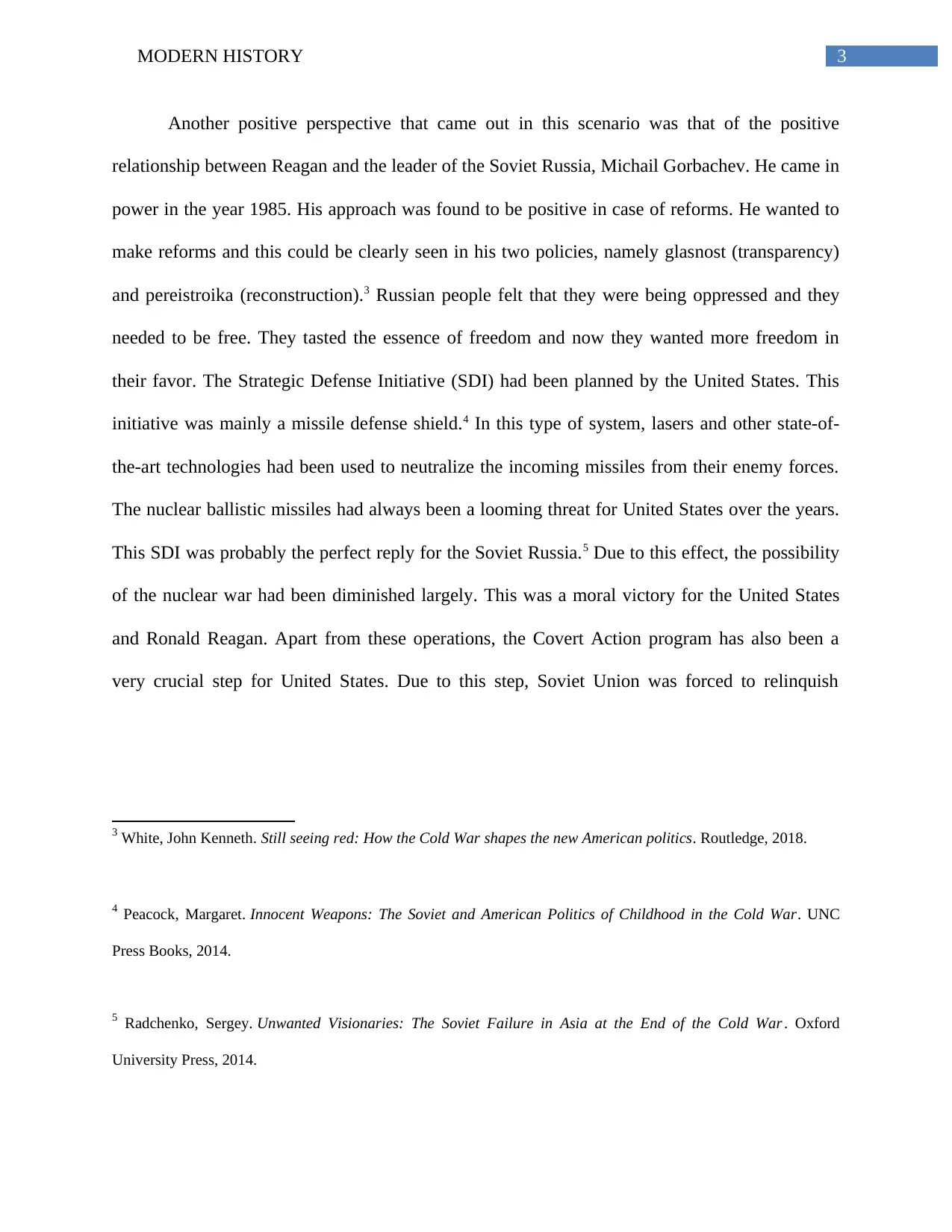
3MODERN HISTORY
Another positive perspective that came out in this scenario was that of the positive
relationship between Reagan and the leader of the Soviet Russia, Michail Gorbachev. He came in
power in the year 1985. His approach was found to be positive in case of reforms. He wanted to
make reforms and this could be clearly seen in his two policies, namely glasnost (transparency)
and pereistroika (reconstruction).3 Russian people felt that they were being oppressed and they
needed to be free. They tasted the essence of freedom and now they wanted more freedom in
their favor. The Strategic Defense Initiative (SDI) had been planned by the United States. This
initiative was mainly a missile defense shield.4 In this type of system, lasers and other state-of-
the-art technologies had been used to neutralize the incoming missiles from their enemy forces.
The nuclear ballistic missiles had always been a looming threat for United States over the years.
This SDI was probably the perfect reply for the Soviet Russia.5 Due to this effect, the possibility
of the nuclear war had been diminished largely. This was a moral victory for the United States
and Ronald Reagan. Apart from these operations, the Covert Action program has also been a
very crucial step for United States. Due to this step, Soviet Union was forced to relinquish
3 White, John Kenneth. Still seeing red: How the Cold War shapes the new American politics. Routledge, 2018.
4 Peacock, Margaret. Innocent Weapons: The Soviet and American Politics of Childhood in the Cold War. UNC
Press Books, 2014.
5 Radchenko, Sergey. Unwanted Visionaries: The Soviet Failure in Asia at the End of the Cold War . Oxford
University Press, 2014.
Another positive perspective that came out in this scenario was that of the positive
relationship between Reagan and the leader of the Soviet Russia, Michail Gorbachev. He came in
power in the year 1985. His approach was found to be positive in case of reforms. He wanted to
make reforms and this could be clearly seen in his two policies, namely glasnost (transparency)
and pereistroika (reconstruction).3 Russian people felt that they were being oppressed and they
needed to be free. They tasted the essence of freedom and now they wanted more freedom in
their favor. The Strategic Defense Initiative (SDI) had been planned by the United States. This
initiative was mainly a missile defense shield.4 In this type of system, lasers and other state-of-
the-art technologies had been used to neutralize the incoming missiles from their enemy forces.
The nuclear ballistic missiles had always been a looming threat for United States over the years.
This SDI was probably the perfect reply for the Soviet Russia.5 Due to this effect, the possibility
of the nuclear war had been diminished largely. This was a moral victory for the United States
and Ronald Reagan. Apart from these operations, the Covert Action program has also been a
very crucial step for United States. Due to this step, Soviet Union was forced to relinquish
3 White, John Kenneth. Still seeing red: How the Cold War shapes the new American politics. Routledge, 2018.
4 Peacock, Margaret. Innocent Weapons: The Soviet and American Politics of Childhood in the Cold War. UNC
Press Books, 2014.
5 Radchenko, Sergey. Unwanted Visionaries: The Soviet Failure in Asia at the End of the Cold War . Oxford
University Press, 2014.
Secure Best Marks with AI Grader
Need help grading? Try our AI Grader for instant feedback on your assignments.
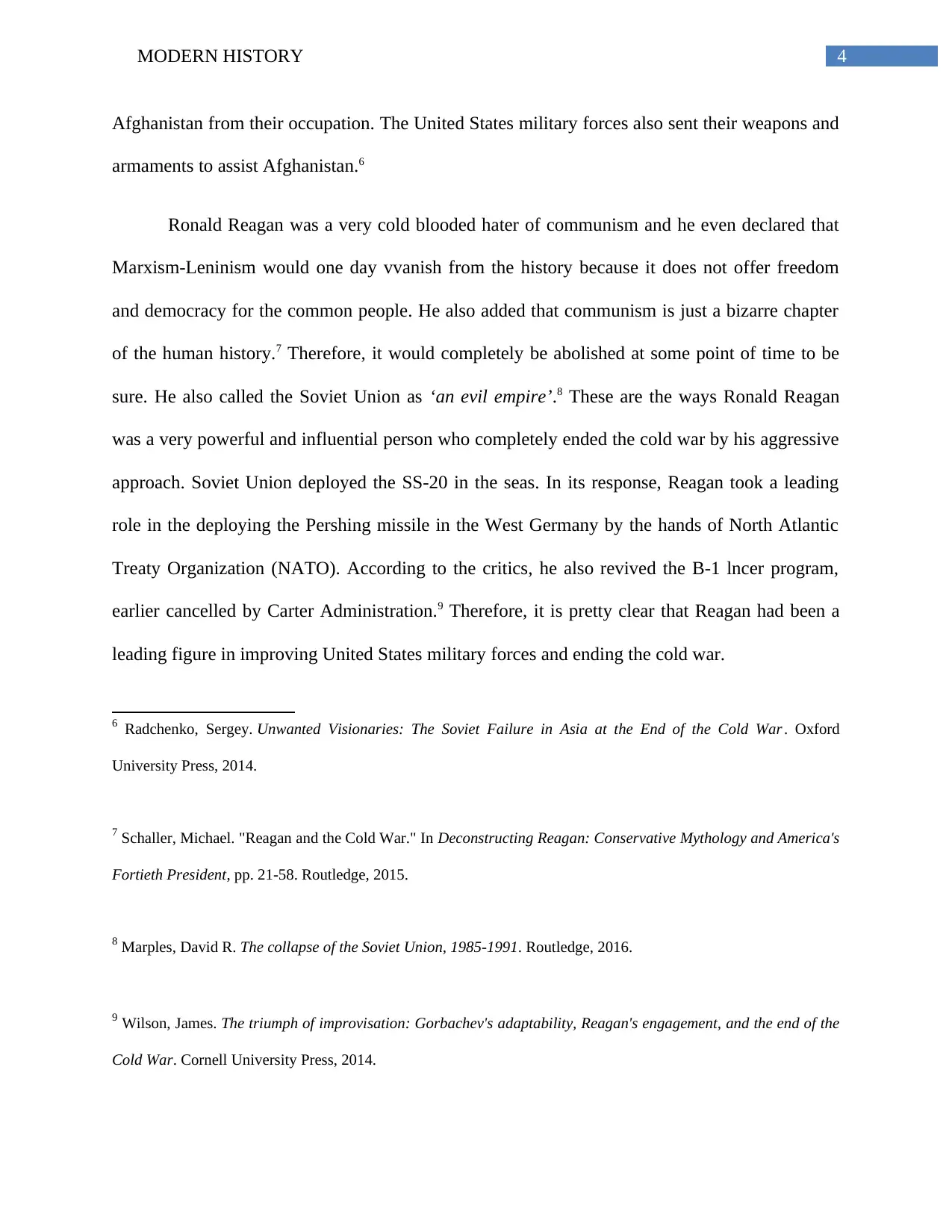
4MODERN HISTORY
Afghanistan from their occupation. The United States military forces also sent their weapons and
armaments to assist Afghanistan.6
Ronald Reagan was a very cold blooded hater of communism and he even declared that
Marxism-Leninism would one day vvanish from the history because it does not offer freedom
and democracy for the common people. He also added that communism is just a bizarre chapter
of the human history.7 Therefore, it would completely be abolished at some point of time to be
sure. He also called the Soviet Union as ‘an evil empire’.8 These are the ways Ronald Reagan
was a very powerful and influential person who completely ended the cold war by his aggressive
approach. Soviet Union deployed the SS-20 in the seas. In its response, Reagan took a leading
role in the deploying the Pershing missile in the West Germany by the hands of North Atlantic
Treaty Organization (NATO). According to the critics, he also revived the B-1 lncer program,
earlier cancelled by Carter Administration.9 Therefore, it is pretty clear that Reagan had been a
leading figure in improving United States military forces and ending the cold war.
6 Radchenko, Sergey. Unwanted Visionaries: The Soviet Failure in Asia at the End of the Cold War . Oxford
University Press, 2014.
7 Schaller, Michael. "Reagan and the Cold War." In Deconstructing Reagan: Conservative Mythology and America's
Fortieth President, pp. 21-58. Routledge, 2015.
8 Marples, David R. The collapse of the Soviet Union, 1985-1991. Routledge, 2016.
9 Wilson, James. The triumph of improvisation: Gorbachev's adaptability, Reagan's engagement, and the end of the
Cold War. Cornell University Press, 2014.
Afghanistan from their occupation. The United States military forces also sent their weapons and
armaments to assist Afghanistan.6
Ronald Reagan was a very cold blooded hater of communism and he even declared that
Marxism-Leninism would one day vvanish from the history because it does not offer freedom
and democracy for the common people. He also added that communism is just a bizarre chapter
of the human history.7 Therefore, it would completely be abolished at some point of time to be
sure. He also called the Soviet Union as ‘an evil empire’.8 These are the ways Ronald Reagan
was a very powerful and influential person who completely ended the cold war by his aggressive
approach. Soviet Union deployed the SS-20 in the seas. In its response, Reagan took a leading
role in the deploying the Pershing missile in the West Germany by the hands of North Atlantic
Treaty Organization (NATO). According to the critics, he also revived the B-1 lncer program,
earlier cancelled by Carter Administration.9 Therefore, it is pretty clear that Reagan had been a
leading figure in improving United States military forces and ending the cold war.
6 Radchenko, Sergey. Unwanted Visionaries: The Soviet Failure in Asia at the End of the Cold War . Oxford
University Press, 2014.
7 Schaller, Michael. "Reagan and the Cold War." In Deconstructing Reagan: Conservative Mythology and America's
Fortieth President, pp. 21-58. Routledge, 2015.
8 Marples, David R. The collapse of the Soviet Union, 1985-1991. Routledge, 2016.
9 Wilson, James. The triumph of improvisation: Gorbachev's adaptability, Reagan's engagement, and the end of the
Cold War. Cornell University Press, 2014.
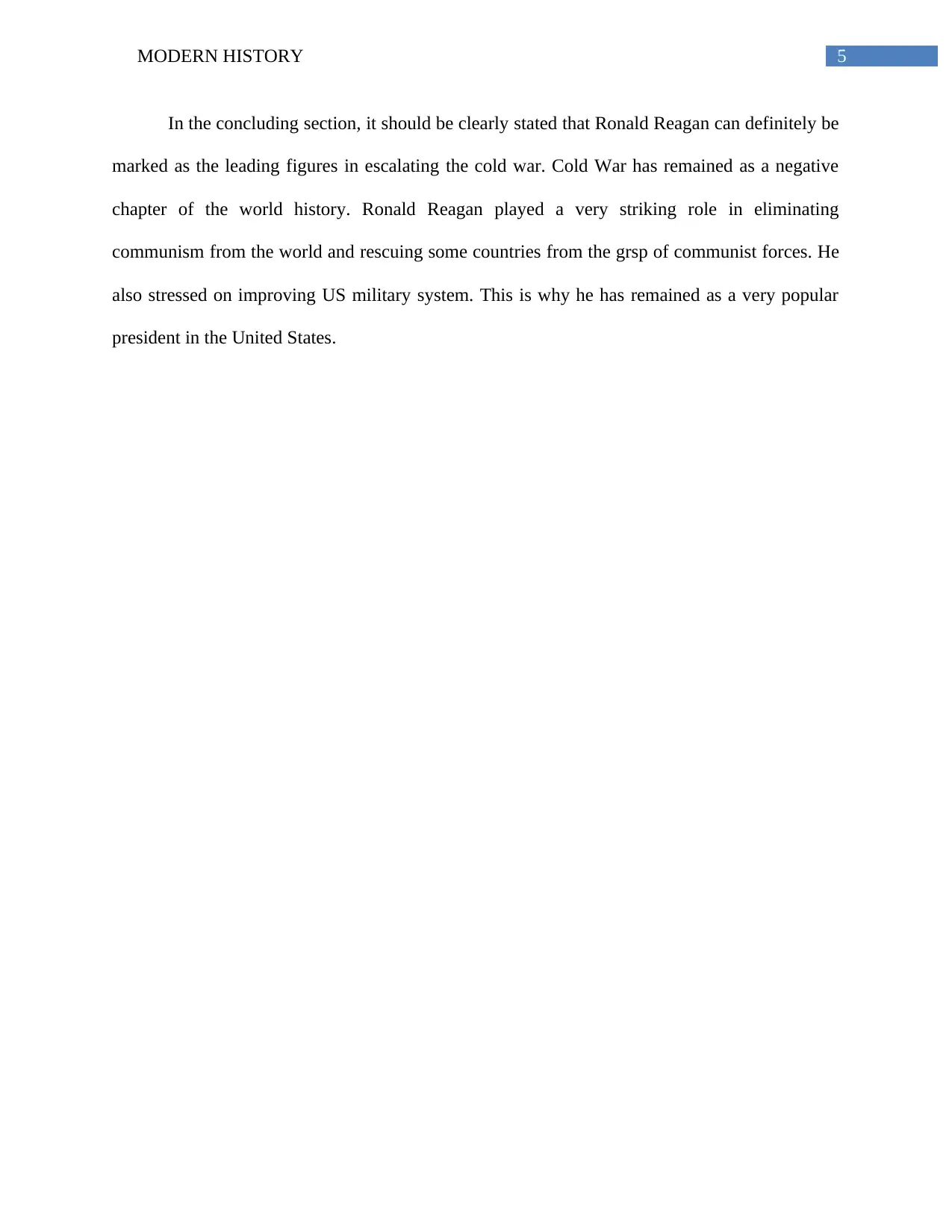
5MODERN HISTORY
In the concluding section, it should be clearly stated that Ronald Reagan can definitely be
marked as the leading figures in escalating the cold war. Cold War has remained as a negative
chapter of the world history. Ronald Reagan played a very striking role in eliminating
communism from the world and rescuing some countries from the grsp of communist forces. He
also stressed on improving US military system. This is why he has remained as a very popular
president in the United States.
In the concluding section, it should be clearly stated that Ronald Reagan can definitely be
marked as the leading figures in escalating the cold war. Cold War has remained as a negative
chapter of the world history. Ronald Reagan played a very striking role in eliminating
communism from the world and rescuing some countries from the grsp of communist forces. He
also stressed on improving US military system. This is why he has remained as a very popular
president in the United States.
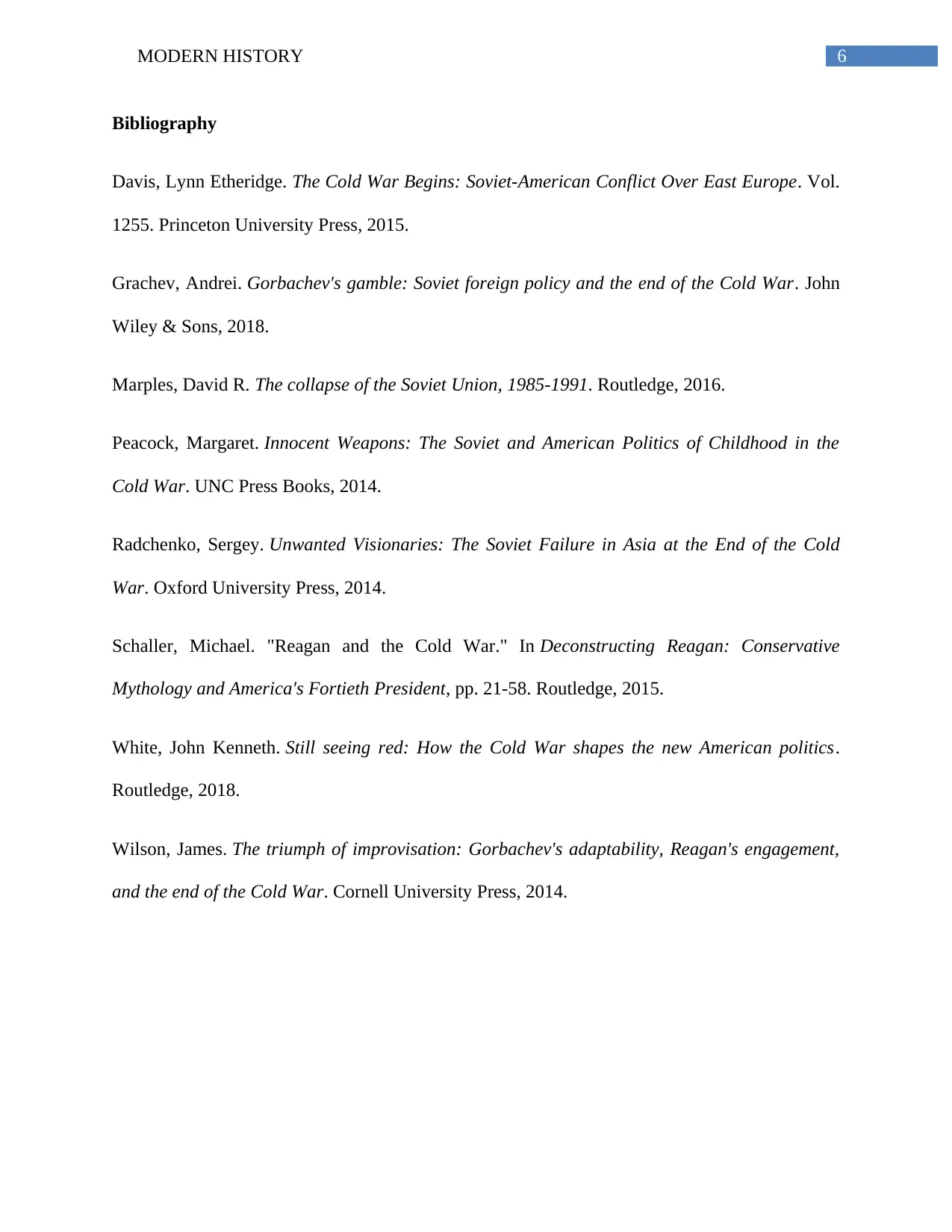
6MODERN HISTORY
Bibliography
Davis, Lynn Etheridge. The Cold War Begins: Soviet-American Conflict Over East Europe. Vol.
1255. Princeton University Press, 2015.
Grachev, Andrei. Gorbachev's gamble: Soviet foreign policy and the end of the Cold War. John
Wiley & Sons, 2018.
Marples, David R. The collapse of the Soviet Union, 1985-1991. Routledge, 2016.
Peacock, Margaret. Innocent Weapons: The Soviet and American Politics of Childhood in the
Cold War. UNC Press Books, 2014.
Radchenko, Sergey. Unwanted Visionaries: The Soviet Failure in Asia at the End of the Cold
War. Oxford University Press, 2014.
Schaller, Michael. "Reagan and the Cold War." In Deconstructing Reagan: Conservative
Mythology and America's Fortieth President, pp. 21-58. Routledge, 2015.
White, John Kenneth. Still seeing red: How the Cold War shapes the new American politics.
Routledge, 2018.
Wilson, James. The triumph of improvisation: Gorbachev's adaptability, Reagan's engagement,
and the end of the Cold War. Cornell University Press, 2014.
Bibliography
Davis, Lynn Etheridge. The Cold War Begins: Soviet-American Conflict Over East Europe. Vol.
1255. Princeton University Press, 2015.
Grachev, Andrei. Gorbachev's gamble: Soviet foreign policy and the end of the Cold War. John
Wiley & Sons, 2018.
Marples, David R. The collapse of the Soviet Union, 1985-1991. Routledge, 2016.
Peacock, Margaret. Innocent Weapons: The Soviet and American Politics of Childhood in the
Cold War. UNC Press Books, 2014.
Radchenko, Sergey. Unwanted Visionaries: The Soviet Failure in Asia at the End of the Cold
War. Oxford University Press, 2014.
Schaller, Michael. "Reagan and the Cold War." In Deconstructing Reagan: Conservative
Mythology and America's Fortieth President, pp. 21-58. Routledge, 2015.
White, John Kenneth. Still seeing red: How the Cold War shapes the new American politics.
Routledge, 2018.
Wilson, James. The triumph of improvisation: Gorbachev's adaptability, Reagan's engagement,
and the end of the Cold War. Cornell University Press, 2014.
1 out of 7
Related Documents
Your All-in-One AI-Powered Toolkit for Academic Success.
+13062052269
info@desklib.com
Available 24*7 on WhatsApp / Email
![[object Object]](/_next/static/media/star-bottom.7253800d.svg)
Unlock your academic potential
© 2024 | Zucol Services PVT LTD | All rights reserved.





